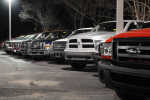The local effects of a national problem: A Fort Scott auto dealer travels to Washington to encourage a $14 billion industry loan

By Justin Messner
The Fort Scott Tribune
WASHINGTON -- As the nation watches and waits for a Congressional decision regarding the bailout of America's "Top 3" auto manufacturers -- Ford, General Motors and Chrysler -- one local resident has put his knowledge to work.
Fort Scott Shepherd Team Auto Plaza President David Shepherd returned Wednesday evening from a three-day trip to Washington in which he was joined by auto dealers from more than 100 cities across the nation. The visit was used as an opportunity for individuals to plead their case with representatives who will ultimately decide whether the auto industry should receive a $14 billion loan package.
Bringing dealers into the picture is part of the National Automobile Dealers Association's latest attempt at showing how widespread the effects could be if one of the nation's auto manufacturers was forced to close.
"This isn't about a few factories in Detroit -- referring to GM, Ford and Chrysler," said NADA Director of Legislative Affairs Bailey Wood in an interview with The Tribune Wednesday. "It's about the dealership on every Main Street, U.S.A. ... It's about the dealerships on Main Street, Fort Scott."
Shepherd echoed these claims, reporting a drop off in sales of about 40 percent in November and the release of about 10 percent of his staff.
"We have 50 employees," said Shepherd. "If any of the auto manufacturers go under, maybe we go under. It really trickles down very fast."
Despite deep discounts and consumers incentives, U.S. auto sales plunged to their lowest levels in 26 years. In 2008, auto sales fell by more than 3 million units from 2007 when auto sales accounted for more than $690 billion in U.S. retail sales, or about 20 percent of all retail sales.
Shepherd said the loss in sales can impact local government just as much as national. He said as sales continue to fall, "Fort Scott loses that sales tax money."
Beyond the local and national government's tax losses due to low automotive sales, one in 10 American jobs depends on the auto industry, as well as the health of communities, dealers and suppliers in all 50 states. General Motors, Ford and Chrysler directly employ 240,000 people, provide health care to nearly 2 million Americans and pay pension benefits to 775,000 retirees and surviving spouses. The Big Three support another 5 million American jobs at parts suppliers, service providers and auto dealerships across all 50 states.
According to data collected by NADA, there are approximately 14,000 U.S.-brand dealers in cities and towns across the country employing approximately 740,000 people, with a payroll of some $35 billion.
Kansas' new-vehicle dealerships alone, account for over 10,000 jobs and 13.2 percent of the state's retail payroll, according to KADA figures.
These figures were just some utilized by Shepherd and the band of dealers flown to Washington to speak with Congress members.
"We wanted to make sure they (Congress) were clear how important it is not to let any of the Big 3 fail," said Wood. "The ripple effects that would trickle down through the economy would be devastating."
The combined effort of NADA and car dealers appeared to be successful Wednesday night -- at least in the first of three rounds -- as House leaders passed the bill 237-170 despite strong opposition from Republican Senate members. The bill will now move on to a Senate vote, most likely Friday, then Wood says he hopes the bill will be on the President's desk by Monday for final approval.
Though House members passed the bill, some lawmakers representing auto-states continued to be unhappy with the plan.
After serious concerns regarding the use of bailout money after $70 billion was supplied to several national banks headed towards bankruptcy, the auto-loan bill was required to be overseen by a "car czar."
"While I am fighting to save Missouri auto jobs," said Missouri Republican Senator Christopher S. Bond, "Congress is just putting off the inevitable unless we force the companies to reform fundamentally, which this latest plan fails to do and is why I am offering changes to make it work."
Included in the czar's responsibilities is their power to veto automaker expenditures over $100 million and to ban bonuses for the 25 most highly-paid employees at each company.
"I am really impressed with the representatives we have in Washington from Kansas," Shepherd said. "They have a tough decision to make and they aren't taking it lightly. They are spending our (taxpayer) money and they understand that."
